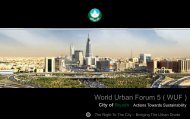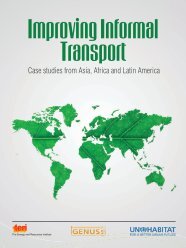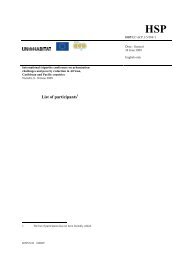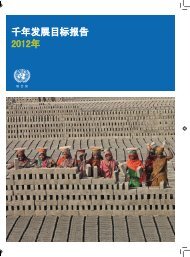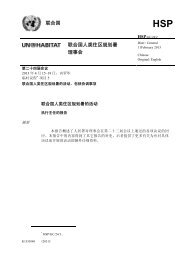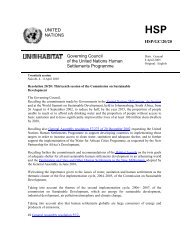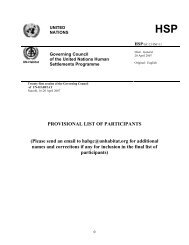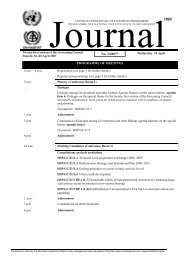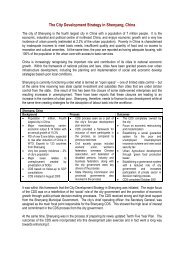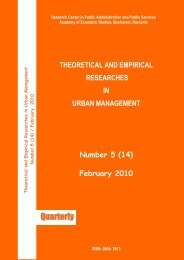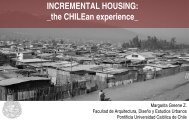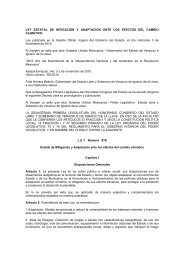Harmonious cities - UN-Habitat
Harmonious cities - UN-Habitat
Harmonious cities - UN-Habitat
Create successful ePaper yourself
Turn your PDF publications into a flip-book with our unique Google optimized e-Paper software.
OPINION Message from the Executive Director<br />
2<br />
It is a great pleasure to present a<br />
new magazine. And indeed it is an<br />
auspicious occasion to be doing<br />
so at the fourth session of the World Urban<br />
Forum in Nanjing, China. <strong>UN</strong>-HAB-<br />
ITAT’s new quarterly flagship magazine,<br />
Urban World, replaces <strong>Habitat</strong> Debate as we<br />
move forward with the times, with a more<br />
modern magazine for our growing global audience<br />
in this rapidly urbanising world.<br />
It is also auspicious that our writers in this<br />
inaugural issue include one of the greatest<br />
leaders of our times, Archbishop Emeritus<br />
Desmond Tutu, the South African Nobel<br />
peace laureate, a household name around<br />
the world. It is indeed a great privilege<br />
too that the pages of this launch issue are<br />
graced by some of the most preeminent<br />
urban thinkers and doers in the world like<br />
H. Peter Oberlander, a founding father of <strong>UN</strong>-HABITAT, and<br />
Professor Emeritus at the University of British Colombia School<br />
of Community and Regional Planning, in Vancouver, Canada,<br />
the place of our agency’s birth in 1978.<br />
Peter Oberlander, author of our first cover story, and Rakesh<br />
Mohan, Deputy Governor, Reserve Bank of India, remind us<br />
that <strong>cities</strong> are the greatest legacy of humanity. And as <strong>cities</strong> are<br />
now growing to the point where in the next generation or so it is<br />
projected that two-thirds of us will be living in an urban world,<br />
they tell us that we had better think constructively and positively<br />
about it.<br />
This is especially important these days with the melt-down of<br />
mortgage finance systems that have had a terrible contagion on<br />
the Wall Street banking system. Where it has been necessary,<br />
institutions have had to be nationalised, even in a market<br />
economy.<br />
Our new magazine, one of the first products of our Mid-term<br />
Strategic and Institutional Plan (2008-2013), is born right<br />
at this historic turning point. And indeed all of our eminent<br />
authors whose work appears in this inaugural edition and in<br />
the future will help us ensure that we bring you a balanced and<br />
authoritative report back on these matters every quarter.<br />
The current housing finance crisis in the developed world<br />
has demonstrated beyond reasonable doubt that in matters<br />
of delivering adequate shelter for all, which is so close to our<br />
mandate, that governments must drive the process. They must<br />
take the lead both in providing land for affordable housing<br />
development, and also in promoting and supervising housing<br />
finance systems that are pro-poor and which will cater for all<br />
income groups.<br />
It is in our quest for harmonious <strong>cities</strong> – the theme chosen for<br />
the Nanjing Forum and this first issue of the magazine – that<br />
we must work harder than ever. It is the duty of governments<br />
to ensure that everybody can feel that they live in a clean,<br />
democratic, tolerant space in relative comfort and security, and<br />
that they have a right to the city. Women especially must have<br />
the right to feel safe in the city.<br />
It is only apt therefore, that I use this occasion to disclose<br />
here the results of <strong>UN</strong>-HABITAT’s latest research published<br />
u r b a n<br />
WORLD<br />
November 2008<br />
in our new flagship report, also launched<br />
in Nanjing, the State of the World’s Cities,<br />
namely:<br />
Sixty-two percent of people living in<br />
towns and <strong>cities</strong> in sub-Saharan Africa<br />
today live in slums.<br />
Of 2.2 billion inhabitants of the urban<br />
areas in the developing world, 810 million<br />
people or 36.5 percent are slum dwellers.<br />
Sub-Saharan Africa accounts for 175<br />
million slum dwellers, or 62.2 percent of<br />
the region’s urban population. In all of<br />
Asia, 36 percent of the 1.4 billion urban<br />
residents live in slum conditions. The<br />
highest prevalence in Asia at the subregional<br />
level is found in south Asia where<br />
43 percent of the urban population are<br />
slum dwellers. In eastern Asia 36 percent<br />
of the urban population are slum dwellers.<br />
In southeast Asia and western Asia, slum dwellers are relatively<br />
low at 27 and 24 percent respectively. In Latin America and<br />
the Caribbean, 27 percent of urban dwellers live in slums<br />
representing 118 million people.<br />
Even the developed world is not immune. Our survey has<br />
established that six percent of the population in developed<br />
countries live under slum-like overcrowded conditions and<br />
without secure tenure.<br />
These facts tell us therefore that the urbanisation of poverty<br />
is arguably the single-biggest development challenge facing the<br />
world today.<br />
No longer can we ignore the plight of these slum dwellers who<br />
live in life-threatening conditions. The majority of sufferers are<br />
always women and the children they support. Nor can we hide<br />
from the fact that their numbers are projected to reach two billion<br />
by 2030 if current trends prevail. We are facing a serious crisis.<br />
The fact that slums are growing around the world reflects<br />
a crisis in governance and government. When many urban<br />
dwellers – mostly young people aged 20-40 living in poverty –<br />
feel excluded and left behind by their <strong>cities</strong> and towns, they will<br />
react, disrupting social order and harmony.<br />
We know that governments and municipalities simply cannot<br />
tackle these problems alone. Much of the financing and much<br />
of the expertise for such change has to come from the private<br />
sector.<br />
And so our new magazine for the first time carries advertising<br />
from companies around the world, including those which have<br />
joined the United Nations Global Compact, a <strong>UN</strong> initiative<br />
to encourage businesses worldwide to adopt sustainable and<br />
socially responsible policies in the areas of human rights, labour,<br />
the environment, social services delivery, and anti-corruption.<br />
With Urban World, we are delighted to move forward with<br />
some of these private sector partners on the road to sustainable,<br />
harmonious <strong>cities</strong> as part of this vital Compact.<br />
Anna Tibaijuka



